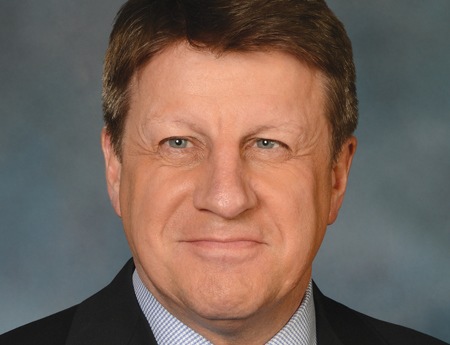Dave Lougee

The smarter way to stay on top of broadcasting and cable industry. Sign up below
You are now subscribed
Your newsletter sign-up was successful
When Gracia Martore was interviewing Dave Lougee to become president of Gannett Broadcasting in 2007, she was impressed by the then-Belo executive VP’s pure love of journalism.
“You could feel it in the interview,” says Martore, the president and CEO of Tegna (formerly Gannett). “It was just absolutely clear that he was very passionate about ensuring that local journalism would continue to thrive in local communities.”
And when Gannett acquired Belo in 2013 and six London Broadcasting Co. stations in 2014, Martore was supremely confident that Lougee could lead a broadcast division that had doubled in size.
Also Read: Dave Lougee Steps Into Tegna CEO Job
“I can tell you, I felt incredibly comfortable acquiring those stations,” Martore says, “because I knew Dave and his team would be fantastic and successful as both integrators and operators of those stations.”
That’s because, before he was a producer, before he was an operator, before he was a manager and a VP and then president of Gannett Broadcasting and now Tegna Media, Lougee was a journalist —even before he knew it.
Lougee grew up in the southeastern Connecticut town of East Lyme. His parents, who worked during the day and served on boards and committees for the church and community at night, instilled into young Dave the importance of public service.
The smarter way to stay on top of broadcasting and cable industry. Sign up below
A paperboy, Lougee would come home from school and, instead of immediately delivering the afternoon edition of The New London Day, he’d read it cover to cover. This was during Watergate, and he’d devour the Woodward and Bernstein stories picked up from The Washington Post.
Lougee, now 56, says he’s just one of many people from his generation inspired by that era of journalism. But they didn’t all go on to become president of the country’s fourth-largest television broadcaster.
“I didn’t know it at the time,” he says, “but I got the bug.”
When Lougee started at the University of Colorado, his goal was to become a lawyer. A friend of his was interning at the CBS station in nearby Denver. Lougee applied and, with his experience as chair of the student board of the Colorado public interest research group, was accepted.
John Hinckley Jr.’s assassination attempt of President Ronald Reagan came a few days before Lougee started the internship in 1981. Because Hinckley had been living with his parents in Evergreen, Colo., a Denver suburb, the CBS station went live with Dan Rather on one of Lougee’s first days. “I saw the adrenaline involved in it and I was hooked,” he says.
Initially thinking he wanted to be a reporter, Lougee soon changed his mind. He saw the control room full of monitors and people and a chain-smoking guy in charge of the show called the producer with a cereal bowl for his ashtray. The intern office was right below, and Lougee could hear cigarette butts being stamped out on the floor with the producer’s foot. “At first I thought, ‘I’ll die,’” Lougee recalls. “But the more I thought about it, the more I thought, ‘That’s what I want to do, have editorial control of a newscast on live television.’”
He moved up the ranks quickly at various Denver stations, from writer to producer to news director. Hoping to oversee editorial coverage on the next Watergate, Lougee moved to Washington, D.C., to serve as news director of WRC but instead led coverage of the Monica Lewinsky scandal.
“That was a bit disheartening,” he says.
From D.C., Lougee went to KING in Seattle, then to Belo Corp., and soon was in charge of Gannett Broadcasting. Since Gannett doubled in size, his job has changed somewhat in the last two years, as he has delegated more of his day-to-day operating responsibilities to focus on innovation for the future. Mergers often fail because of culture clashes, Lougee says, but that wasn’t a problem with the Belo acquisition.
“He more than achieved what we expected,” Martore says. “You sometimes alienate the folks you’re acquiring, but rather he made them feel totally part of the company and that they had an important role in the company.”
“We try not to force things on people as much as give them the tools and learning and allow them to passionately learn things themselves ,” Lougee adds.
Martore calls Lougee an “inspirational leader.” The two visit all their TV stations, and Lougee wows the staff with his passion for communities and his clear message about the importance of reaching consumers and viewers on all platforms, not just linear TV.
Lougee, who was elected joint board chairman of the National Association of Broadcasters in June, has also impressed in leadership roles for numerous organizations.
“He is smarter than most people working in this industry today,” says Marci Burdick, Schurz Communications’ senior VP of broadcasting, who serves on the NAB executive committee with him. “Every time there’s a complex subject, he is able to pull together groups of executives to work on the problem and get it dealt with.”
The best advice Lougee has ever received is that his job is not about having the right answer but about being responsible for the process that comes up with it. Not that his work is only about solutions; Lougee considers his job as journalist and broadcaster an honor.
“Most people have jobs that demand a lot of them. It means a lot more when your job has a purpose, when you’re contributing to something bigger that just yourself,” Lougee says. “That’s the privilege of working in broadcasting, a lot of people have the opportunity to be part of something bigger than themselves every day.”
